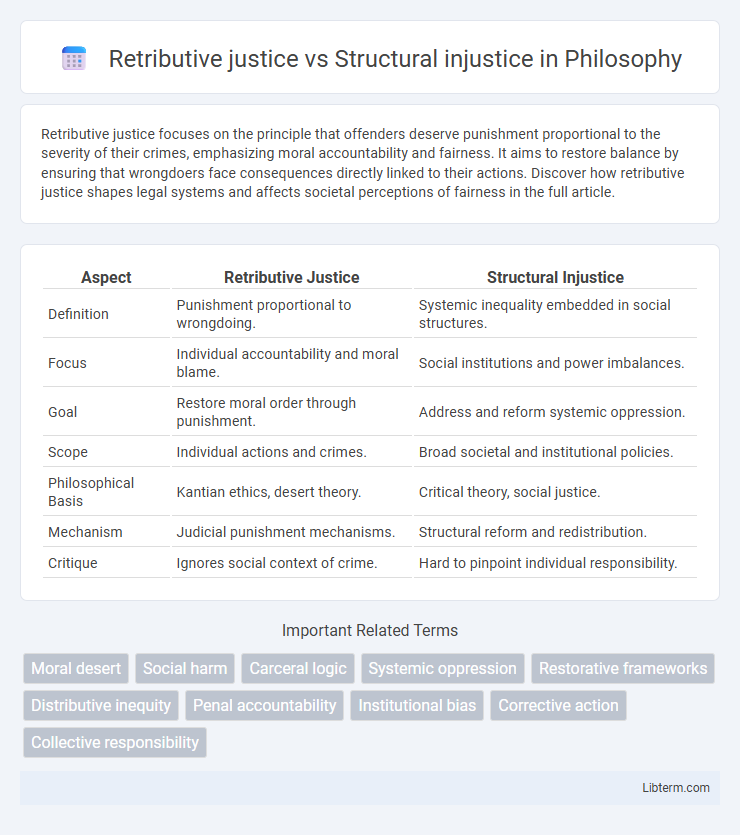Retributive justice focuses on the principle that offenders deserve punishment proportional to the severity of their crimes, emphasizing moral accountability and fairness. It aims to restore balance by ensuring that wrongdoers face consequences directly linked to their actions. Discover how retributive justice shapes legal systems and affects societal perceptions of fairness in the full article.
Table of Comparison
| Aspect | Retributive Justice | Structural Injustice |
|---|---|---|
| Definition | Punishment proportional to wrongdoing. | Systemic inequality embedded in social structures. |
| Focus | Individual accountability and moral blame. | Social institutions and power imbalances. |
| Goal | Restore moral order through punishment. | Address and reform systemic oppression. |
| Scope | Individual actions and crimes. | Broad societal and institutional policies. |
| Philosophical Basis | Kantian ethics, desert theory. | Critical theory, social justice. |
| Mechanism | Judicial punishment mechanisms. | Structural reform and redistribution. |
| Critique | Ignores social context of crime. | Hard to pinpoint individual responsibility. |
Introduction to Retributive Justice and Structural Injustice
Retributive justice centers on punishing individuals for wrongdoing based on moral culpability and proportionality, emphasizing accountability and deterrence. Structural injustice refers to systemic inequalities embedded in social, economic, and political institutions that perpetuate harm regardless of individual intent. Understanding these concepts involves examining the contrast between individual responsibility and collective conditions shaping unfair outcomes.
Defining Retributive Justice: Principles and Practices
Retributive justice centers on the principle of punishment proportionate to the offense committed, emphasizing accountability and moral balance within the legal system. Its practices involve sentencing that aims to deter wrongdoing, provide reparation to victims, and uphold societal norms through judicial processes. This approach contrasts with broader frameworks that address systemic inequalities underlying structural injustice.
Structural Injustice: Concept and Implications
Structural injustice refers to systemic inequalities embedded within social, economic, and political institutions that produce and perpetuate harm to marginalized groups. Unlike retributive justice, which focuses on punishing individual wrongdoers, structural injustice addresses the underlying societal conditions that enable persistent disparities and oppression. Its implications demand comprehensive policy reforms aimed at dismantling institutional biases and ensuring equitable access to resources and opportunities.
Historical Contexts of Retribution and Structural Harm
Retributive justice originated in ancient legal systems emphasizing punishment proportional to individual wrongdoing, reflecting societal norms of moral culpability and deterrence. Structural injustice emerges from systemic inequalities embedded in institutions, perpetuating harm over generations through economic, racial, or social disparities rather than isolated acts. Historical contexts reveal retribution as reactive justice for discrete offenses, while structural harm highlights enduring societal frameworks that demand transformative accountability beyond individual punishment.
Core Philosophical Differences
Retributive justice centers on punishing individuals for their wrongdoing, emphasizing moral responsibility and proportional consequences aligned with the offense. Structural injustice critiques systemic inequalities embedded in social, economic, and political institutions, focusing on collective responsibility and the need for reform rather than individual blame. The core philosophical difference lies in retributive justice prioritizing individual accountability, while structural injustice highlights the pervasive impact of institutional frameworks on perpetuating harm.
Impact on Legal Systems and Policies
Retributive justice emphasizes punishment proportional to the offense, shaping legal systems to prioritize individual accountability and deterrence through sentencing guidelines, criminal codes, and court procedures. Structural injustice highlights systemic inequalities embedded in laws and policies, prompting reforms aimed at addressing social determinants, institutional biases, and discriminatory practices in areas like housing, education, and policing. Legal frameworks influenced by structural injustice research increasingly incorporate restorative justice models, equity-focused policies, and socio-legal interventions to mitigate long-term disparities beyond mere punishment.
Addressing Inequality: Retribution vs. Structural Solutions
Retributive justice focuses on punishing offenders to address individual wrongs, often neglecting underlying social inequalities that perpetuate injustice. Structural injustice demands systemic reforms targeting root causes such as economic disparity, institutional biases, and unequal access to resources, emphasizing redistribution and policy change. Effective solutions to inequality prioritize addressing these structural barriers over solely punitive measures to achieve lasting social equity.
Social Consequences of Retributive Approaches
Retributive justice often results in heightened social division and stigmatization of offenders, as it emphasizes punishment over rehabilitation or systemic change. This approach can perpetuate cycles of inequality by neglecting the root causes of crime, such as poverty and discrimination. Moreover, communities may experience increased mistrust and reduced social cohesion due to the adversarial nature of retributive measures.
Reforming Justice: Toward Structural Change
Retributive justice emphasizes punishment for individual wrongdoing, often neglecting the underlying social and economic inequalities that perpetuate crime and injustice. Structural injustice calls for systemic reform addressing root causes such as poverty, discrimination, and unequal access to resources to create lasting change. Reforming justice requires shifting focus from punitive measures to transformative policies that promote equity, accountability, and restorative outcomes within legal and social institutions.
Conclusion: Bridging Retributive and Structural Perspectives
Bridging retributive justice and structural injustice requires integrating individual accountability with systemic reform to address both personal wrongdoing and the root causes of inequality. Effective justice systems combine legal sanctions for offenses with policies aimed at transforming social structures that perpetuate harm. This synthesis fosters equitable outcomes by balancing punishment with restorative and preventive measures targeting broader societal change.
Retributive justice Infographic

 libterm.com
libterm.com